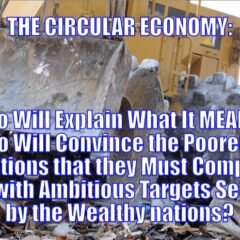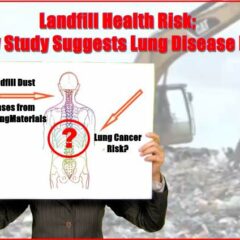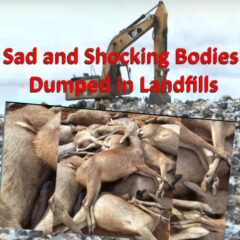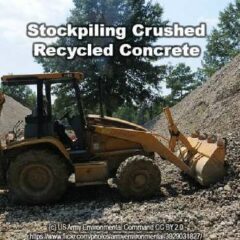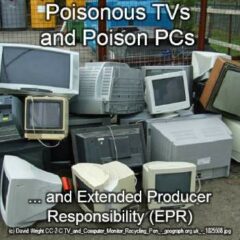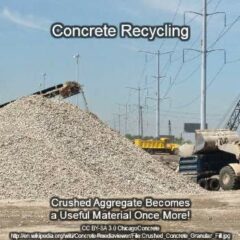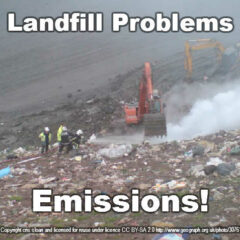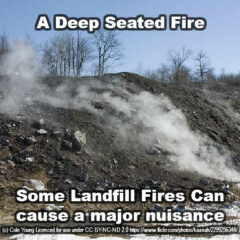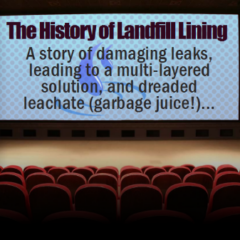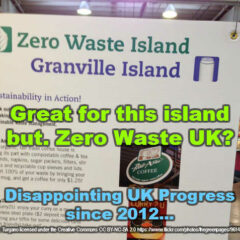Poor Performing EU States are Failing to Meet Waste Diversion Targets
Poor performing EU member states are failing to meet waste diversion targets, a new EU Report explains. Cyprus, Croatia, Greece, Malta and Turkey are still sending more than three quarters of their municipal waste to landfill. The EU will also, soon take Slovakia to court for violating landfill rules, and failing to achieve sufficient waste diversion away from […]
Landfill Health Risk – Study Suggests Lung Disease Link
Is there a landfill health risk to those who live near them? Landfills have been seen as safe for a long while. That landfills do not affect the health of those that live near them, has been assumed since the 1990s. That was when a UK government study looked for any link between the national […]
Sad and Shocking Bodies Dumped in Landfills in the Last 10 Years
The following bodies and body parts have been dumped in landfills in the last 10 years. Unfortunately, sad things happen, and then he remains have to be disposed of in the best way possible in the circumstances. Sometimes, animals die and are not suitable for using for food production, or rendering down for other uses. Also, when […]
All UK Landfills to Close within 5 Years? Zero Waste UK
In this article we make the prediction that all UK Landfills will close within 5 Years. The current trend in waste reduction/ diversion from landfill shows that the nation will achieve Zero Waste to Landfill and quite soon as well. That momentous occasion will take place in 5 to 6 years time, according to the figures […]
Recycling Revisited – Contamination Risk from Lead Based Paint On Concrete
Ensuring The Safe Use/Disposal of Recycled Concrete When Painted With Lead Based Paint On this page we provide the Wikipedia cited content from an article titled, “Recycling Revisited” which was showing as a broken link in Wickipedia (En), and an update on current guidelines. The original article was by Charles Rathmann,ᅠand dated August 4, 2005,ᅠin the Western […]
Poisonous TVs and Poison PCs and Extended Producer Responsibility (EPR)
US Report Titled – Poison PCs and Toxic TVs (Also Highly Relevant to Mobile Phone Recycling) Poison PCs and Toxic TVs, was a broken citation link in Wikipedia (Ref: 2 at the following url, http://en.wikipedia.org/wiki/Mobile_phone_recycling, but we found that it is available on the “WayBack Machine”, by following this link.: https://web.archive.org/web/20100707004243/http://www.svtc.org/site/DocServer/ppcttv2004.pdf?docID=301ᅠ [box type=”info”]Vistors from Wikipedia should […]
Concrete Recycling
A “Natural” For Aggregates Producers Staff: Western Builder, 12/2/2004 Recycling concrete and asphalt rubble and the results of demolition can be a really profitable addition to an aggregates quarrying organisation’s competitive arsenal, as numerous operators in this industry have discovered in recent years. In fact, a road-portable recycling system could make back its original investment […]
Why Recycle My Mobile Device? Smartphone Tablet etc
When people ask “why recycle my mobile device“, we reply that it is important that you do recycle all mobile phones, cell phones, tablets etc. That is because recovering the gold, silver, palladium and copper found in 50 million cell phones would reduce the demand for mining fresh metals by nearly 14 tons annually, according […]
Why Every Landfill Liner Leaks But Not All Leakage Matters
Landfill liner leaks are endemic. A small amount escapes from composite landfill lining systems which include both 1 metre thick a clay layer, and a clay liner loses water/ leachate according to its permeability and the head of pressure of leachate over it. That is despite applying stringent design and operational requirements for landfills, landfills continue […]
Landfill Environmental Problems – Emissions
MSW Landfills are very unpopular due to the many environmental problems which have been attributed to landfills. In Europe there is massive investment underway to substantially reduce reliance on landfills. In many areas worldwide landfill space is running out, due to public hostility arising from public perception of landfills and environmental problems, and a crisis […]
Landfill Fires Intentional and Unintended Shallow and Deep Seated
Landfill fires occur fairly commonly within landfills throughout the world, and to this day much burning of waste on landfills takes place in many developing nations. We classify landfill fires into two types; intentional and unintentional. Intentional Landfill Burning Burning of municipal waste in the open is not recommended under any circumstances, although in some […]
When Does a Landfill Stop Being a Landfill – Final Storage Quality
When Does an Old Landfill Cease to be a Landfill? In other words, when can an old landfill be left as it is, not monitored and used for any purpose it’s owner wants to use it for, because it no longer contains anything which harm the environment? [box size=”large” style=”rounded” border=”full”]There is an easy and […]
The History of Landfill Lining Design [Infographic]
The Evolution of Landfill Lining Design in the UK from Dilute and Disperse to Full Containment The image above is one that we published back in 2004 and is one of the most important progressions in the history of landfills in the UK. It was a webpage in itself and rendered in efficient HTML code […]
Zero Waste and UK Recycling Progress
Landfills vary immensely, but even the most recently developed are not considered to provide a sustainable way of getting rid of rubbish. They can cause pollution, and certainly hold the potential to do so. Very few of us want to live near to them, and the methane gas produced by them is a major contributor […]
